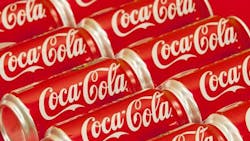WASHINGTON -- Faced with falling sales of its diet soda, Coca-Cola (IW 500/27) is running ads that say its sugar-free beverages sweetened with the chemical aspartame are safe.
The print ads, which began appearing Wednesday in major U.S. newspapers, show a pair of laughing women, one holding a bottle of diet Coke in hand, alongside text that reads: "Quality products you can always feel good about."
The copy beneath the picture says, "The safety of aspartame is supported by more than 200 studies over the last 40 years."
The ad appeared today in USA Today. The newspaper said in an accompanying news article that the Coke promotion would appear in the Atlanta Journal Constitution on Thursday and the Chicago Tribune next week.
The soda industry is facing declining U.S. sales as some blame sugary drinks for fueling the obesity epidemic in America.
Diet Coke sales fell 3% in 2012 compared to a year earlier, and Coke was down 1%, according to Beverage Digest. Meanwhile, Pepsi slid 3.4% and Diet Pepsi fell 6.2%.
Long-Term Safety in Dispute
Scientists are not in agreement on whether aspartame, approved in the 1980s, is safe over the long term, said Karen Congro, a nutritionist and director of the Wellness for Life Program at the Brooklyn Hospital Center.
"Despite claims from Coke and other companies about the safety of aspartame, we still don't know about its long-term effects," Congro said.
She added that there is a growing backlash against diet soda as well as products with artificial sweeteners and other artificial ingredients.
Congro said recent research shows that dieters who consume artificial sweeteners can actually end up craving more calories.
"Relying on artificial sweeteners probably causes cravings for sweets and sugar, which can contribute to obesity and poor eating habits," she said. "It's possible that the brain reacts to artificial sweeteners in diet soda and other products by sending out insulin, which can make people hungry--especially for sugar.
The U.S. Food and Drug Administration says aspartame "may be safely used in food in accordance with good manufacturing practice as a sweetening agent and a flavor enhancer in foods."
U.S. consumer group the Center for Science in the Public Interest holds that aspartame should not be in the food supply because it has been shown to cause cancer in lab animals.
However, the center's executive director, Michael Jacobsen, said consumers should know that "the greater and more immediate danger to their health is posed not by artificial sweetened products, but by the full-calorie versions of Coke, Pepsi, and other sugar drinks."
"Rather than posing small risks of cancer, the high-fructose corn syrup or other sugars in these drinks cause obesity, diabetes, heart disease, and other health problems," Jacobsen said. "Everyone would be better off drinking water or seltzer water instead."
Copyright Agence France-Presse, 2013
About the Author
Agence France-Presse
Copyright Agence France-Presse, 2002-2025. AFP text, photos, graphics and logos shall not be reproduced, published, broadcast, rewritten for broadcast or publication or redistributed directly or indirectly in any medium. AFP shall not be held liable for any delays, inaccuracies, errors or omissions in any AFP content, or for any actions taken in consequence.
